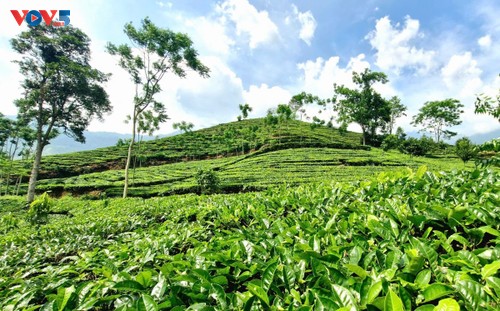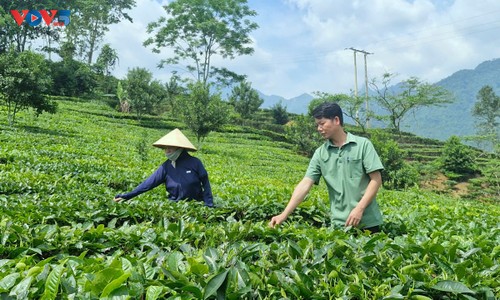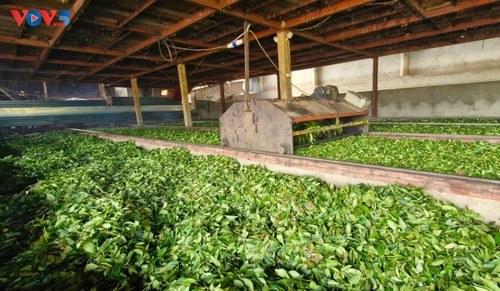 Tea is becoming one of key crops in Van Chan district, Yen Bai province. (Photo: Thua Xuan) Tea is becoming one of key crops in Van Chan district, Yen Bai province. (Photo: Thua Xuan) |
As the second of four annual harvests approaches, tea farmers in Van Chan are busy nurturing their crops to secure another fruitful yield. Nguyen Thi Ngan, a tea grower from Nam Bung commune with two decades of experience, told VOV that, with one hectare of tea, her family earns a net income of 3,800 USD per year, significantly higher than other crops.
“Tea offers much greater economic returns than any other crop. It takes only three years to begin harvesting, and by the fifth year, the yields are stable and substantial,” said Ngan.
Tea cultivation is deeply rooted in Nam Bung, where nearly 90% of households grow tea on 570 hectares dedicated to high-density Shan Tuyet tea. The commune produces 7,000 tons of tea leaves annually, generating 1.9 million USD in revenue. The tea sector has played a crucial role in reducing the local poverty rate to 7% last year.
Phan Luan, acting Chairman of the Nam Bung People’s Committee, said, “We regularly guide farmers on proper care and harvesting techniques to maintain plant health and ensure productivity in subsequent seasons. We encourage the use of approved pesticides toward transitioning to biological alternatives. Our long-term goal is to achieve OCOP certification for Shan Tuyet tea.”
 Ms. Nguyen Thi Ngan of Nam Bung commune has grown tea for 20 years. (Photo: Thua Xuan) Ms. Nguyen Thi Ngan of Nam Bung commune has grown tea for 20 years. (Photo: Thua Xuan) |
Van Chan district is home to 50 tea enterprises and production facilities, many of which have invested in modern technology to meet domestic and global standards. The district has 4,600 hectares of tea, including 1,500 hectares of Shan Tuyet tea in upland communes like Suoi Giang, Gia Hoi, and Nam Bung.
The first tea harvest of the year yielded 10,000 tons of leaves, and Van Chan aims to reach 50,000 tons by year-end, generating about 1.3 million USD in revenue. According to Phu The Hanh, Deputy Head of the district’s Agriculture and Environment Section, support policies have been rolled out to help farmers improve tea varieties, expand raw material zones, and shift to organic and environmentally friendly practices.
“We have advised the district authorities to help businesses access programs and policies like Resolution 69 on strengthening farmers associations, establishing growing area codes and standardized production zones, and promoting products,” said Hanh, adding, “We also help farmers adopt advanced cultivation techniques and access new high-yield tea varieties to shorten growing cycles and promote sustainable, organic tea farming.”
 One of the steps in black tea processing (Photo: Thua Xuan) One of the steps in black tea processing (Photo: Thua Xuan) |
Van Chan tea is establishing a firmer position in the Vietnamese tea market. To fully unlock its economic potential, the district plans to strengthen collaboration among farmers, enterprises, and local authorities to build a value chain that spans cultivation, processing, and marketing.